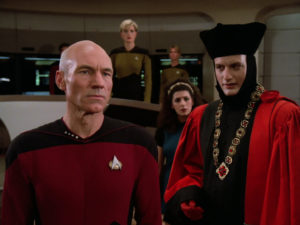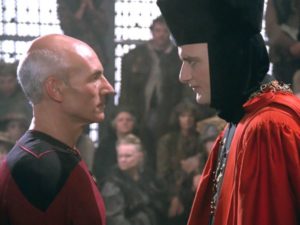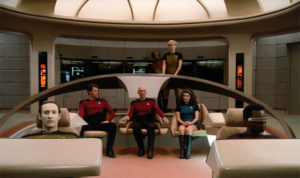Series Overview:
Thirty years ago, Star Trek: The Next Generation embarked on a journey that would solidify the popularity of a franchise, redefine science fiction entertainment, and take us on some incredibly cool, wholly memorable journeys. With so many great, genre-defining episodes it’s impossible to sum up the series in a handful of paragraphs. But despite being broadcast in an era where serialized storytelling wasn’t as prevalent as it is today, it’s the overarching story of TNG that allows us to examine it as a whole.
There’s such an enormity of great stories in The Next Generation (TNG) that one could write a thesis on most of them. [Check out “Trektember” over at Redeeming Culture for some great episodic reviews]. In discussing the series as a whole, however, I believe we find a road map in the crew’s dealings with Q, everybody’s favorite immortal jester in the court of Picard. His humorous yet insightful musings on human nature are the very essence of what Star Trek seeks to convey. Star Trek might be set amidst the idea of space exploration, but it is ultimately exploring who we are as human beings.
Space is not the final frontier. The first and last frontier we have to discover is ourselves.
So strap in, set phasers to stun, beam yourself up (ok I’m done) and follow us as we tackle TNG as best we can in a four-part series that examines the weaving story and the wondrous exploration experienced by the crew of the Enterprise NCC 1701-D.
Find all four parts here:
Part 1 – Encounter at Far Point and Human Nature
Part 2 – Q Who and The Nature of Calling
Part 3 – Tapestry and our Personal Natures
Part 4 – All Good Things… and Our Eternal Purpose
Part 1 – Encounter at Farpoint and Human Nature
It’s weird to go back and watch the pilot episode of a series I’ve spent over a quarter century admiring. Don’t get me wrong, Encounter at Farpoint totally holds up, especially with the recent Blu-ray remastering with high resolution graphics. But in a culture super-saturated with internet memes (with literal hundreds of them containing Captain Picard) seeing this crew we’ve now known for 30 years getting introduced to each other is just something that feels so foreign. The story, though, is pitch perfect for launching our journey with the crew of the Enterprise-D (more on that in a second) and it makes for a fascinating exploration of the pervading theme of the series- discovery.
 Just as soon as our crew sets off, they’re faced with a test of survival not just for their own lives, but the entire human race (so they’re told). Luckily, humanity has the greatest Captain of them all on our side, who also just so happens to be the greatest character on television ever (no, you’re exaggerating!). As Picard will discover just seven years later, this begins a long trial for the sins of humanity care of the nefarious, god-like Q. This the first of eight appearances for Q in TNG, and as he sticks an intrusive magnifying glass up to humanity, his story weaves a tapestry of discovery of what makes us who we are.
Just as soon as our crew sets off, they’re faced with a test of survival not just for their own lives, but the entire human race (so they’re told). Luckily, humanity has the greatest Captain of them all on our side, who also just so happens to be the greatest character on television ever (no, you’re exaggerating!). As Picard will discover just seven years later, this begins a long trial for the sins of humanity care of the nefarious, god-like Q. This the first of eight appearances for Q in TNG, and as he sticks an intrusive magnifying glass up to humanity, his story weaves a tapestry of discovery of what makes us who we are.
Q: You will now answer to the charge of being a grievously savage race.
Picard: ‘Grievously savage’ could mean anything. I will answer only specific charges.
Q: Are you certain you want a full disclosure of human ugliness? So be it, fool.
Q’s inability to see why some things are more important than others, that all life has value, or to understand that mortality adds value makes him the perfect pilot to navigate these explorations of human nature. He has no stake in us, and thus is a neutral party. Essentially, Q is how many people see God- an aloof being casting judgement on humanity from afar. This is no doubt a reflection of creator Gene Roddenberry, a self-proclaimed atheist. Is the goal to assert that humanity is good enough to not need God? Maybe. But by showing Q to continually be wrong about the human race, it does more to affirm the idea that we do need a God who is compassionate and personal.
 In the episode, Picard talks Q into letting him prove humanity’s worth. The mystery of Farpoint station, once solved, would be enough to satisfy Q, so he says. They do solve it, of course, but it’s not the resolution of the puzzle that sways Q, it’s the choice made by Picard of how he solves it. Picard relentlessly pursues compassion, looking for worth in every being, even the vile Zorn. Instead of destroying the new creature or Zorn or his people, Picard chooses justice and grace to arrive at the right conclusion.
In the episode, Picard talks Q into letting him prove humanity’s worth. The mystery of Farpoint station, once solved, would be enough to satisfy Q, so he says. They do solve it, of course, but it’s not the resolution of the puzzle that sways Q, it’s the choice made by Picard of how he solves it. Picard relentlessly pursues compassion, looking for worth in every being, even the vile Zorn. Instead of destroying the new creature or Zorn or his people, Picard chooses justice and grace to arrive at the right conclusion.
Picard: If we’re going to be damned, let’s be damned for what we really are.
Humanity could easily be condemned for our “ugliness.” In scripture we see many pictures of human wickedness and depravity. Thankfully, the gospel show us that under grace we are not condemned in the eyes of God. This shares a parallel with TNG’s belief that humanity, while certainly ugly, is redeemable. We could be damned for what we really are, but we’re not. Roddenberry is right that we don’t need an indifferent God, condemning us from on high. We need a God that knows who we really are, and works to redeem us anyway. Because of Christ, we have that.
Go back and revisit Encounter at Farpoint if you haven’t in a while. It’s been around for 30 years now, you know. The episode stands firmly on its own as an excellent entry into the Star Trek canon. In the sea of poor episodes that make up Season One of TNG, it’s almost surprising the pilot is so good. Picard is still at his savage English gentleman best, Data is at his most curious, and Worf is still very instinctively Klingon. The separation and docking of the “saucer” section of the ship is treated with more reverence than it ever would be again. The awe of the Enterprise permeates the episode. And best of all, Q and Picard’s infamous squabbles kick off with a punch.
 Check out any Top 25 (or so) list of the best TNG episodes, and you probably won’t find Encounter at Farpoint. Hey, there’s just a lot of great TNG. But the central themes of the series are uniquely presented within, and it serves to set the stage for the similarly wonderful dramatic presentations of what makes us who we are to come in the series. Some other great examinations of human nature that come to mind for me are The Most Toys, The Masterpiece Society, The Chase, and Peak Performance. Whatever the episode or the journey, one thing is clear- Star Trek: The Next Generation ventures boldly to engage humanity’s core as its crew eagerly treks to “see what’s out there.”
Check out any Top 25 (or so) list of the best TNG episodes, and you probably won’t find Encounter at Farpoint. Hey, there’s just a lot of great TNG. But the central themes of the series are uniquely presented within, and it serves to set the stage for the similarly wonderful dramatic presentations of what makes us who we are to come in the series. Some other great examinations of human nature that come to mind for me are The Most Toys, The Masterpiece Society, The Chase, and Peak Performance. Whatever the episode or the journey, one thing is clear- Star Trek: The Next Generation ventures boldly to engage humanity’s core as its crew eagerly treks to “see what’s out there.”



5 comments